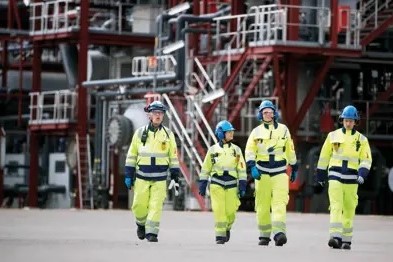 UPM Kaukas – a pioneer in the circular economy celebrates its 150th anniversary
UPM Kaukas – a pioneer in the circular economy celebrates its 150th anniversary
The UPM Kaukas mill has demonstrated a continuous capacity for renewal throughout its 150-year history. The latest top products produced at Kaukas are biofuels and biochemicals made from the residual crude tall oil left over from pulp production.The UPM Kaukas mill site in Lappeenranta, Finland, forms a unique bioforest industry integrate, producing pulp, magazine paper, sawn timber, energy, and biofuels from renewable raw materials. UPM's largest R&D centre is also located at the Kaukas mill site.
It all started in 1873, when the Kaukas Fabrik Aktiebolag company built a factory for manufacturing spools on the outskirts of Kaukaankoski in the municipality of Mäntsälä. The company later expanded east of Lappeenranta on the shores of Lake Saimaa. The production of birch-wood spools began at the current Kaukas mill site in 1892.
During the 20th century, a plywood mill, a sawmill and a paper mill were built in the area, and a biorefinery started operations in 2015. Pulp has been produced at Kaukas since 1897.
"I think the story of Kaukas is a great one in the sense that the circle has been closed not only physically here on the site of the spool factory, where the biorefinery is today, but also through the circulation of raw materials. In the production of spools, 90% of the wood raw material was initially left over until later when the surplus material was used to make pulp. Today, the crude tall oil residue from pulp cooking is a valuable raw material for new products," says Jaakko Nousiainen, Production Director at UPM Biofuels and head of the UPM Biorefinery in Lappeenranta.
The Kaukas mill can rightly be called a pioneer of the circular economy and the most versatile forest industry integrate in the world. None of the raw material is wasted: in addition to the products of the biorefinery, for example, sawdust is mainly used as pulp raw material, heat and energy are produced from the rest of the sawdust and bark, and ash is used for land construction and fertilisers. The mill site’s production has adapted to the current demand and market situation, and over the years Kaukas has manufactured such products as artificial silk, spirits, boats, hockey sticks and cholesterol-reducing sitosterol.
Continuous improvement and local responsibility
Vesa Volmari, General Manager of UPM Kymi mill integrate and pulp mill, worked as the General Manager of the UPM Kaukas mill integrate and pulp mill from August 2018 until August 2023. He believes that the long history of Kaukas is, above all, a testament to its ability to innovate in a changing world.
"On several occasions we have been able to meet new challenges and shifting demand, and to maintain customer confidence and competitiveness, which is a prerequisite for any business," says Volmari.
According to Volmari, a basic prerequisite for long-term operations is also to keep the mill running smoothly through regular maintenance and investments. At Kaukas, for example, major investments were made in 2016 and 2018 into the entire recovery line, fibre line and drying machine to improve reliability and production levels.
"In line with the lifecycle plan, the plant's uptime is ensured through both continuous preventive maintenance and regular maintenance shutdowns and inspections during the shutdowns."
In Volmari’s view, what makes the Kaukas integrate unique from a mill manager's perspective is at least the fact that the four different businesses must work seamlessly together as a whole. Another special feature is the location of the mill in the middle of the city, next to a sensitive water area, which has required cooperation with environmental authorities, among others.
"We are the largest private employer in the region, which means we generate significant tax revenue and wealth. We strive to be an open and good neighbour to the people of Lappeenranta, and actively cooperate not only with the city of Lappeenranta but also with local educational institutions, for example, to secure the future workforce."
Responsible alternatives to fossil products
The Lappeenranta Biorefinery producing wood-based renewable diesel and naphtha – UPM BioVerno – is the latest development in the Kaukas integrate, and the first of its kind in the world. Jaakko Nousiainen has been involved in concept development and scaling up biofuel production from pilot to commercial scale from the very beginning. In 2017, UPM BioVerno's market expanded from domestic to EU level and into petrochemical products such as bioplastics used in various end products. The refinery currently has an annual production capacity of around 130,000 tonnes.
"Planning further growth in Rotterdam, the Netherlands, is a significant step for the future of the business as a whole. An investment decision has not been made. Detailed commercial plan and basic engineering studies continue," says Nousiainen.
All in all, he believes that biofuel production is part of a historical continuum that has at its core the Finnish people's appreciation of forests, responsible forest management and the ability to use wood raw material responsibly.
"Responsibility is about taking the value chain as far as possible and trying to process the valuable raw material down to the last molecule, rather than just burning it. For example, our naphtha can end up in bio-based Dyneema® fibres, textiles and polymers, thus reducing the carbon footprint of products," Nousiainen concludes.
